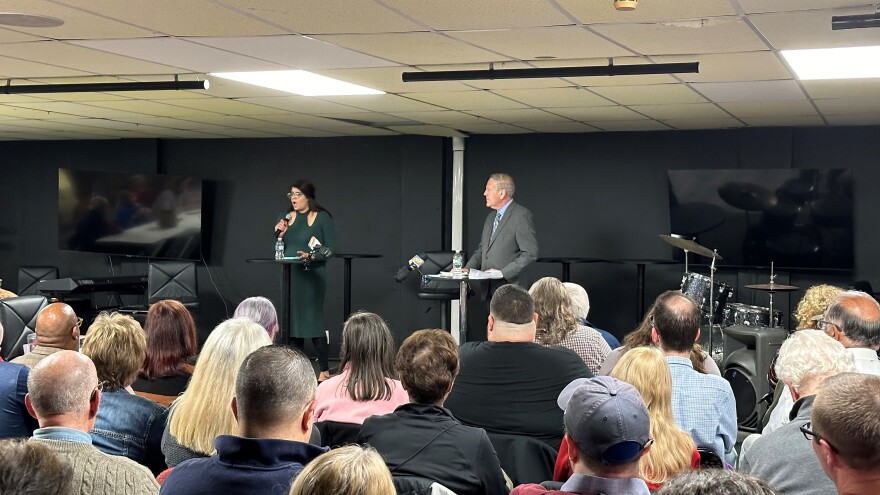EASTON, Pa. — The first face-off of candidates for the 136th state House District Democratic primary ruffled some feathers among both candidates and their constituents Tuesday night.
Crowd reactions appeared to favor incumbent state Rep. Robert Freeman over challenger Taiba Sultana, an Easton city councilwoman, throughout the event. Constituents packed the basement of Greater Shiloh Church.
Each candidate was provided 10 minutes for an opening statement before crowdsourced questions — drawn from a collection of index cards attendees were afforded — were directed at one or both contenders, with occasional room for rebuttals.
Questions ranged from basic civics — What does a representative do? — to personal inquisitions — particularly around support for a cease-fire in the Israel-Hamas war and logical strategies to address the international affair — evoking plenty of resounding applause for Freeman, alongside some quippy reactions as Sultana worked through her answers.
Much of Sultana’s commentary stemmed from personal experience, touching upon her immigration to Pennsylvania to her escape from an abusive relationship to life as a homeless mother before ascending to Easton City Council.
“As someone who experienced homelessness and with my children in public housing, I'm a strong advocate for affordable housing. As a mother with children in public schools, I'm dedicated to fighting for fully and fair public education. I believe that every child, regardless of their ZIP code and socioeconomics deserves quality education in Pennsylvania,” Sultana said.
“Additionally, as the daughter of a breast cancer survivor, I strongly believe that health care is a fundamental human right. It is unacceptable that many Pennsylvanians lack access to affordable and quality care. I will fight for a single-payer health care system that provides everyone with the care they need, regardless of their income and preexisting conditions. I have been advocating for these critical issues during my time on the council and now it is time for us as a community to rise and be a voice for the voiceless.”
A few barbs thrown at Freeman failed to land — particularly when Sultana said the representative had failed to do “anything out of the ordinary,” which she said was a necessity to promote meaningful change — drawing laughter from the crowd.
Starting with a bit of a lark — “I always enjoy a good work of fiction” — Freeman noted his support from the Sierra Club for environmental action, his lease-to-own initiative, procurement of funding for various projects including parks, infrastructure, EMS, firefighters and more, on top of routinely engaging with the public itself.
“As chair of the House Local Government Committee, I have the clout and expertise to advance good public policy, as I have done. have always conducted myself with integrity and the central attributes of a good public servant: proper conduct, and the temperament and the ability to work with others. I entered public office to give back, and I have done so,” said Freeman, a state lawmaker for 39 years who is seeking his 20th term in the House.
“I wanted to shape public policy to improve people's lives and enhance the quality of life, and I have devoted myself to these tenants, and I have never wavered.”
Questions from the crowd
The tone of the evening quickly became evident upon the first question from the attendees — What does a state representative do, and what does their job consist of?
Sultana quickly responded by stating “It is not a job — it is a public service,” expanding to explain “it doesn’t matter if it’s affordable housing or minimum wage or any other issue,” providing public service is the key element of the position.
Freeman stated “As far as the work of a legislator, it’s manyfold,” including drafting and passing legislation, engaging with constituents on a myriad of issues ranging from legislative topics to everyday problems with formwork, and being present in the public.
Another question touched on public perception of Sultana on Easton City Council and online, alleging she held a contentious attitude toward those who did not agree with her, though Sultana said “we bring different perspectives, different ideologies” to issues which can be debated and resolved.
On the subject of working with colleagues across the aisle, Sultana said she was willing to do so, though she did appear to criticize those who “just try to work with Republicans just to make sure they are OK with everything.”
Freeman addressed the question by noting some of his successes with Republican colleagues, noting “it’s important to find the common ground to make sure you’re working for the public good,” going on to allege Sultana’s conduct in Easton was “divisive.”
A subsequent inquiry about the “most important quality a politician should strive for” led to Sultana revisiting some of her opening statement before stating “Republicans will never support a minimum wage” or increased medical coverage.
Freeman listed an open-door policy for constituents as a keystone, adding “To be a good elected official, you have to be accessible, you have to be compassionate.”
In regard to affordable housing, Sultana suggested a potential plan to invest in public housing which could be eventually flipped to private ownership “to build generational wealth for working families.”
Freeman detailed elements of his lease-to-own plan, in which a portion of a rental payment would be invested in an escrow account. Once the account grows enough to cover closing costs and down payments, “They would then be able to purchase the home.” Freeman pointed out a local demonstration of the concept with Jeff Porter, a former co-owner of Porters’ Pub in Easton, who inspired the idea.
Cease-fires and other controversies
One of the most charged elements of the evening revolved around Sultana’s numerous attempts to introduce an Israel-Hamas cease-fire resolution which would press elected officials in the state to push for an end to the Middle Eastern conflict.
With a quivering and emotional response when asked to comment on the cease-fire, Sultana cited families in the area who had lost dozens of loved ones in Gaza, and emphasized that taxes paid in the 136th District were being directed to support Israel, leading to tens of thousands of civilian deaths.
“It shouldn't be that controversial. It shouldn't be difficult to say, ‘Stop killing civilians, stop killing innocent civilians. Stop funding them, stop sending rockets to children, stop doing that.’ It shouldn't be done,” Sultana said.
Asked about his silence on funding Israel throughout the conflict, Freeman began by denoting that support stemmed from the federal government — not the state, where he serves — before discussing ongoing diplomatic efforts.
“I think the first priority is it's imperative to get humanitarian aid to the civilians in Gaza. And to do that we need some pause in the fight. You know, we talked about cease-fires and pauses, but the best thing happening right now is the diplomatic efforts going on Egypt, Qatar, working with the Biden administration,” Freeman said.
“They're getting closer to the possibility of making some sort of settlement. And that is the path to making sure that there will be something in the way for a long period of time without fighting.”
Asked to list some of her accomplishments on city council, Sultana stated she helped raise the minimum wage for local seasonal workers, expanded benefits and salaries for city workers, increased recognition for Muslim and other minority holidays, and her role in voting in favor of numerous pieces of legislation.
Another question for Freeman asked the representative to explain irregularities found on Sultana’s campaign documentation.
Freeman noted state Sen. Lisa Boscola challenged Sultana when she found her signature on a nominating petition, in addition to seven pages of signatures which were photocopied, stating “I would say the petitions really were questionable.”
Though the question was directed to the representative alone, Sultana was permitted to respond to the allegations, with a statement “My petition was accepted, that means every single signature was accepted by the state,” again eliciting laughter from some in the crowd.
Some common ground
Addressing the idea of ensuring accurate voting, both candidates agreed there was a need for some change.
Freeman advocated for increased accessibility, same-day voter registration, pre-canvassing measures, and other practical measures.
Sultana added that every Pennsylvanian of age should be entitled to vote.
Another question regarding issuing identification and drivers’ licenses to migrants and immigrants expanded on the topic, with Sultana noting that as taxpayers, they deserve access to identification.
Freeman noted a bill is in the works to provide official identification for undocumented individuals.
Both candidates also agreed on reaffirming reproductive rights for women in Pennsylvania, as well as abortion rights. Sultana also noted support for contraceptive access as a pivotal measure to ensure reproductive autonomy.
Closing remarks
Freeman kept his end comments brief, noting how he has served the area for many years, “and this is a great community.”
“And I want to continue providing my knowledge and understanding of the process to advanced public policy that addresses real needs, [that] brings home funding for important new projects and brings us together,” Freeman said.
“In the legislature, I have the working relationships that only years of experience can create. We don't need more divisiveness, we need to build bridges, we need to find common ground my candidacy and my experience offer.”
Sultana noted the importance of change to improve “our community and our future,” again drawing quite the reaction from the crowd when she referred to Freeman as a “back-seat legislator.”
Circling back to her key points, Sultana again noted her focus on providing for working families, seniors, and properly funded childhood education.
“We will make a community that is built on new ideas and 21st-century perspective, and where everyone, no matter who they are or where they are from, has a voice” Sultana said.


